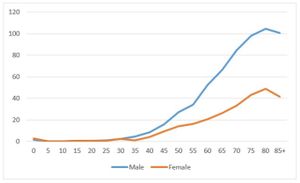The common parasitic infection schistosomiasis presents significant health threats across East Africa, especially within impoverished communities lacking access to clean water and adequate sanitation. Praziquantel (PZQ) stands as the primary treatment for infections caused by the genus Schistosoma, including Schistosoma mansoni, the most prevalent form of the disease on the continent. Recent research, highlighted by Sisay and colleagues, has raised concerns about the efficacy of this treatment across various African countries, urging healthcare policymakers to reconsider single-dose protocols.
A systematic review and meta-analysis conducted on studies published until September 2024 revealed the overall pooled efficacy of single-dose PZQ against S. mansoni as 85% (95% CI: 80-89%). Yet, this figure masks significant discrepancies among regions: the drug was found to be most effective in Rwanda (97.9%), followed by Ethiopia (90.4%), but showed lower rates of efficacy of 75.4% (Tanzania), 71.2% (Kenya), and 68.4% (Uganda). Given such heterogeneity, the findings indicate the necessity of repeated dosing to improve outcomes.
According to the World Health Organization (WHO), schistosomiasis affects over 240 million people worldwide, with the highest disease burden found in sub-Saharan Africa. The transmission of the parasite occurs when cercariae penetrate human skin during contact with infected freshwater bodies. The impacts can be severe, with estimates indicating nearly 12,000 deaths globally each year attributed to schistosomiasis. Preventive measures currently lack effective vaccines, and PZQ remains central to treatment regimens.
While PZQ has historically demonstrated strong efficacy against adult forms of schistosome parasites, concerns about drug resistance and reinfection have emerged. Many infected individuals do not achieve complete cure after treatment, highlighting the complexity of the disease and the parasite's ability to evade treatment. PZQ's effectiveness is also compromised by the inability to prevent reinfection, which is common among individuals who continue to use contaminated water sources.
To look for solutions, Sisay et al. organized their meta-analysis around several criteria, including studies conducted only in English and involving populations with greater than fifty positive cases. This stringent filtering led to 21 studies being included, amounting to nearly 5,000 positive cases of S. mansoni infections. Analysis using Comprehensive Meta-Analysis (CMA) software revealed significant variability across regions and time, raising questions about the drug's long-term efficacy over the years.
Subgroup analyses provide additional insight, indicating PZQ's efficacy increased over more recent years, attaining 91.4% between 2016 and 2023, compared to previous eras—77.0% from 2008 to 2015 and 72.3% from 2000 to 2007. The authors emphasized the necessity for countries like Uganda and Tanzania to look for alternative treatment strategies, as efficacy rates fell below recommended thresholds set by the WHO.
Further complicate the challenge is the considerable heterogeneity observed during the review; I2 was found to be 94.8%, implying the presence of significant differences among the studies' results. Factors contributing to this variability may include the intensity of infections, participant demographics and immune responses, and the specific brands of medications utilized.
Conclusively, Sisay and their fellow researchers advocate for improved deworming initiatives across East Africa, which may involve periodic reassessment of treatment efficacy, particularly for those with less favorable responses to PZQ. Their findings highlight the urgency for deploying multiple doses of therapy, framing it as imperative to sustain health and mitigate the impact of this neglected tropical disease. Investing resources and formulating health policies focused on intestinal parasite control are deemed necessary to address these persistent challenges.



